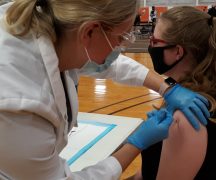Ohio Republicans have introduced another bill to restrict enforcement of the mask mandate in businesses.
State Reps. Bill Reineke of Tiffin and George Lang of West Chester introduced House Bill 799 to rescind one part of a recent state health order requiring heightened enforcement of mask wearing in businesses. State Rep. Haraz Ghanbari, R-Perrysburg, is a co-sponsor.
Ohioans are required to wear masks while patronizing any business. A new order signed on Nov. 13 authorizes state employees, health officials and law enforcement agencies to inspect businesses to make sure mask wearing and other guidelines are being followed.
Officials can issue warnings for non-compliance and a business can be shut down for 24 hours to “allow dissipation of COVID-19 airborne droplets.”
HB 799 would rescind a portion of the Nov. 13 health orderrequiring businesses to allow and cooperate with any government inspections.
Two-dozen Republicans have signed on as bill co-sponsors.
This bill mirrors an effort from the Ohio Senate also targeting that inspection rule.
Neither bill targets the overall mask mandate, which would remain in effect.
These are among numerous bills under consideration in the Ohio Statehouse targeting the authority of the Ohio Department of Health to issue orders to slow the spread of COVID-19. With just a few weeks left in this legislative term, newer proposals like HB 798 would need swift movement this month through committees and the full chambers to reach the governor’s desk.
Gov. Mike DeWine has vowed to veto any bill restricting the executive branch’s authority to respond to a pandemic. He made good on that promise in vetoing Senate Bill 311 last week, which would prevent ODH from issuing widespread quarantine orders in Ohio.
Republicans hold supermajorities in both legislative chambers, with enough members to override this veto.
***
Also from Ohio Capital Journal:
Covid skeptics look to ‘weak links’ in House on bill to gut the health department
Overriding the governor’s veto on legislation that would eviscerate the state health department’s legal power to respond to pandemics could be close, and supportive activists are eyeing two House representatives they see as “weak links” in the chain.
Reps. Gayle Manning and Dave Greenspan, both Republicans, voted against Senate Bill 1 in May, which would have automatically rescinded every new order from the Ohio Department of Health after two weeks unless a legislative panel voted to preserve it.
They were the only Republicans to vote with Democrats on the issue.
Now, the autonomy of the health department, codified in a few short lines of state law giving it “ultimate authority in matters of quarantine and isolation,” could be in their hands. READ MORE
Aisha’s Law: Law enforcement, survivor urge attention to strangulation in domestic violence bill
Paula Walters spent more than a decade battling health problems before doctors diagnosed the traumatic brain injury resulting from a 2006 night when she was strangled by her abuser.
She stood up in front of a recent meeting of the Ohio Senate Judiciary Committee begging the members not to stand down from calls to enhance punishment for strangulation as part of House Bill 3, a domestic violence law passed by the Houseand now in consideration by the Senate. State Rep. Haraz Ghanbari, R-Perrysburg, is a co-sponsor.
“He used a silent weapon called strangulation, that leaves invisible, lifelong injuries,” Walters said.
A former paramedic, Walters vividly remembers her abuser’s hands around her neck, and she also knows the picture shown to law enforcement didn’t show the lacerations she would find out much later were a part of her injuries. READ NOW
Equal pay, gender equity back in the legislature
The issue of gender pay equity has come up yet again in the Ohio Statehouse, after multiple previous attempts to bring the measure to a vote.
State Rep. Stephanie Howse, D-Cleveland, introduced a bill called the Equal Pay Act and one that creates a gender pay equity task force this week, marking the sixth time the topic of equal pay has come up in the state legislature.
House Bill 304 would require state contractors and those that receive “economic incentives” within the state obtain a certificate proving they pay all employees equally for jobs of the same qualifications and enact an evaluation system for public employers “to identify and eliminate sex-based wage disparities,” according to the language of the bill.
The measure would also bar employers from obtaining or asking for a potential employee’s wage or salary history, and prohibits retaliation if employees discuss salary or wage rates. READ MORE





